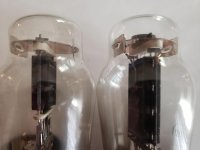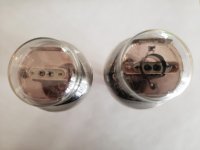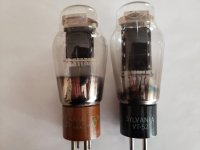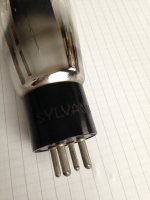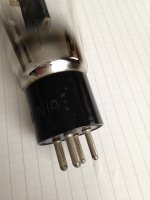I have found a DHT, black base marked Sylvania but there is no type on the tube. Wiped out by history.
Any suggestions? What can it be?
The long plate looks like the VT25/10Y long plate I have, but all my Sylvania long plates have an extra pin to the top mica from the plate. This one does not have that. Also the VT25's all have the mica spacer to the tube on the flat side of the anode. This mystery tube has the spacer on the side, in a different form factor. And the top differs with a short bar to retain the heater side bar for the 10Y and a round structure for the mystery tube. Also, the brand name is stamped in the bakelite base (recessed) and there is a designator H7R next to the logo. The 10/10Y have a modern printed logo on the base.
But more important: the resistance in cold state of the tube differs:
The VT25 and 10 all have 7.5 Volt heaters.
Pictures say it all but will give more questions:
The mystery is the black base tube on the right, compared to a 10Y/VT25
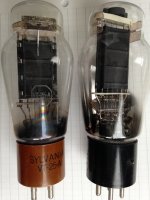
Compared to my other DHT:
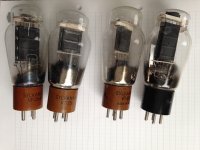
The side view:
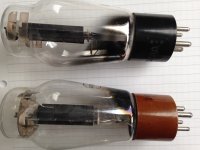
The top view, showing a round structure around the heater bars on the mystery tube on the right:
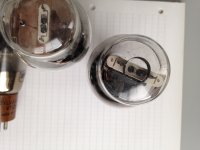
I have looked at the VT52 but these all differ a lot (too).
Any help is welcome.
albert
Any suggestions? What can it be?
The long plate looks like the VT25/10Y long plate I have, but all my Sylvania long plates have an extra pin to the top mica from the plate. This one does not have that. Also the VT25's all have the mica spacer to the tube on the flat side of the anode. This mystery tube has the spacer on the side, in a different form factor. And the top differs with a short bar to retain the heater side bar for the 10Y and a round structure for the mystery tube. Also, the brand name is stamped in the bakelite base (recessed) and there is a designator H7R next to the logo. The 10/10Y have a modern printed logo on the base.
But more important: the resistance in cold state of the tube differs:
- the VT25 long plate has 1.8 ohm,
- the 10 short plate 0.8 ohm,
- the mystery tube 'wins' at 2.8 ohm.
The VT25 and 10 all have 7.5 Volt heaters.
Pictures say it all but will give more questions:
The mystery is the black base tube on the right, compared to a 10Y/VT25

Compared to my other DHT:

The side view:

The top view, showing a round structure around the heater bars on the mystery tube on the right:

I have looked at the VT52 but these all differ a lot (too).
Any help is welcome.
albert
Last edited:
Seeing it has a grid, it must be a triode.
(- some mechanical details make it look like a Sylvania type 81 rectifier)
(- some mechanical details make it look like a Sylvania type 81 rectifier)
I think VT52. I have a pair with the same construction with the exception that mine have the supports running from the long side of the plate to the upper mica as the VT25 in your picture
And how about the resistance of a VT52 heater?
Alle VT52s I saw on google were different .. as far as I could see.
And the ones I saw have a four or three-legged mica on top, like the one in a tube museum.
But then, the VT52 here has the same top structure but a round mica without side plates as far as I can see. A close match!
The 316a I found is like a spaceship of aliens . . . Is it a typo?
Alle VT52s I saw on google were different .. as far as I could see.
And the ones I saw have a four or three-legged mica on top, like the one in a tube museum.
But then, the VT52 here has the same top structure but a round mica without side plates as far as I can see. A close match!
The 316a I found is like a spaceship of aliens . . . Is it a typo?
And how about the resistance of a VT52 heater?
The 316a I found is like a spaceship of aliens . . . Is it a typo?
Nope, that's his/her account name!
And yes, the UHF transmitter from the 1930s looks like a space ship.
Kinda cute, actually.
If you're a really small alien.
⋅-=≡ GoatGuy ✓ ≡=-⋅
And how about the resistance of a VT52 heater?
VT52 were originally used in the BC-AL-230 transmitter as modulators. In that application the filament was wired in series with a VT25 filament and the string was supplied from 12-14 Vdc. My personal opinion is that running any of them at 6.3 volts will work fine.
Here are some photos of mine next to a 10Y
Attachments
VT52 were originally used in the BC-AL-230 transmitter as modulators. In that application the filament was wired in series with a VT25 filament and the string was supplied from 12-14 Vdc. My personal opinion is that running any of them at 6.3 volts will work fine.
Here are some photos of mine next to a 10Y
Yes that's the story I also heard long ago: the VT25 in series with the VT52 in a radio, to get a full battery load. [Only the designated plate load differs a lot]
I see you have them.
Can you measure the resistance? Before I put the tube in a tube tester, I like to know what the ball park is.
Too bad the VT52 is so expensive . . . to get a second one.
If anyone has a matching one without designators on it . . .
Sure, no problem, all my meters are at the shop though so tomorrow or Monday night at the latest before I canCan you measure the resistance?
I will put my tube meter ready, (I have one simple ex NATO stock one for in the field) to start at 2.5V and increase in increments.
I am just a bit afraid this could work adverse; maybe should just wire it up and fire it up slowly. What is a recommendation ?
I am just a bit afraid this could work adverse; maybe should just wire it up and fire it up slowly. What is a recommendation ?
And what does it look like underneath that 1920's socket, that pre-UX4 bayonet?
Here with an RV258 this is what some guy did: dissect the tube foot. 😱
And then it is like Humpty Dumpty, nothing could be put together again
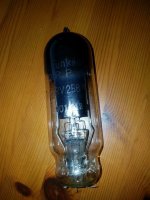
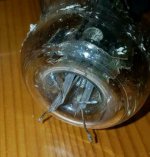
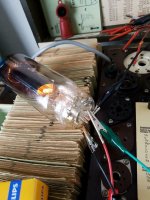
This one is for sale in this very bad shape in a Dutch classified site, for $ 65 right now. Taking away the bottom took away 80-90% of the value
Here with an RV258 this is what some guy did: dissect the tube foot. 😱
And then it is like Humpty Dumpty, nothing could be put together again



This one is for sale in this very bad shape in a Dutch classified site, for $ 65 right now. Taking away the bottom took away 80-90% of the value

- Home
- Amplifiers
- Tubes / Valves
- What tube is this? (UX4, Sylvania, long plate)
